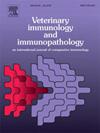Monoclonal antibody development advances immunological research in horses
IF 1.4
3区 农林科学
Q4 IMMUNOLOGY
引用次数: 0
Abstract
Host immune analyses require specific reagents to identify cellular and soluble components of the immune system. These immune reagents are often species-specific. For horses, various immunological tools have been developed and tested by different initiatives during the past decades. This article summarizes the development of well characterized monoclonal antibodies (mAbs) for equine immune cells, immunoglobulin isotypes, cytokines, and chemokines.
单克隆抗体开发推进马匹免疫学研究
宿主免疫分析需要特定的试剂来鉴定免疫系统的细胞和可溶性成分。这些免疫试剂通常具有物种特异性。在过去的几十年中,针对马的各种免疫学工具已被不同的研究机构开发出来并进行了测试。本文总结了针对马免疫细胞、免疫球蛋白异型、细胞因子和趋化因子的特性良好的单克隆抗体(mAbs)的开发情况。
本文章由计算机程序翻译,如有差异,请以英文原文为准。
求助全文
约1分钟内获得全文
求助全文
来源期刊
CiteScore
3.40
自引率
5.60%
发文量
79
审稿时长
70 days
期刊介绍:
The journal reports basic, comparative and clinical immunology as they pertain to the animal species designated here: livestock, poultry, and fish species that are major food animals and companion animals such as cats, dogs, horses and camels, and wildlife species that act as reservoirs for food, companion or human infectious diseases, or as models for human disease.
Rodent models of infectious diseases that are of importance in the animal species indicated above,when the disease requires a level of containment that is not readily available for larger animal experimentation (ABSL3), will be considered. Papers on rabbits, lizards, guinea pigs, badgers, armadillos, elephants, antelope, and buffalo will be reviewed if the research advances our fundamental understanding of immunology, or if they act as a reservoir of infectious disease for the primary animal species designated above, or for humans. Manuscripts employing other species will be reviewed if justified as fitting into the categories above.
The following topics are appropriate: biology of cells and mechanisms of the immune system, immunochemistry, immunodeficiencies, immunodiagnosis, immunogenetics, immunopathology, immunology of infectious disease and tumors, immunoprophylaxis including vaccine development and delivery, immunological aspects of pregnancy including passive immunity, autoimmuity, neuroimmunology, and transplanatation immunology. Manuscripts that describe new genes and development of tools such as monoclonal antibodies are also of interest when part of a larger biological study. Studies employing extracts or constituents (plant extracts, feed additives or microbiome) must be sufficiently defined to be reproduced in other laboratories and also provide evidence for possible mechanisms and not simply show an effect on the immune system.

 求助内容:
求助内容: 应助结果提醒方式:
应助结果提醒方式:


